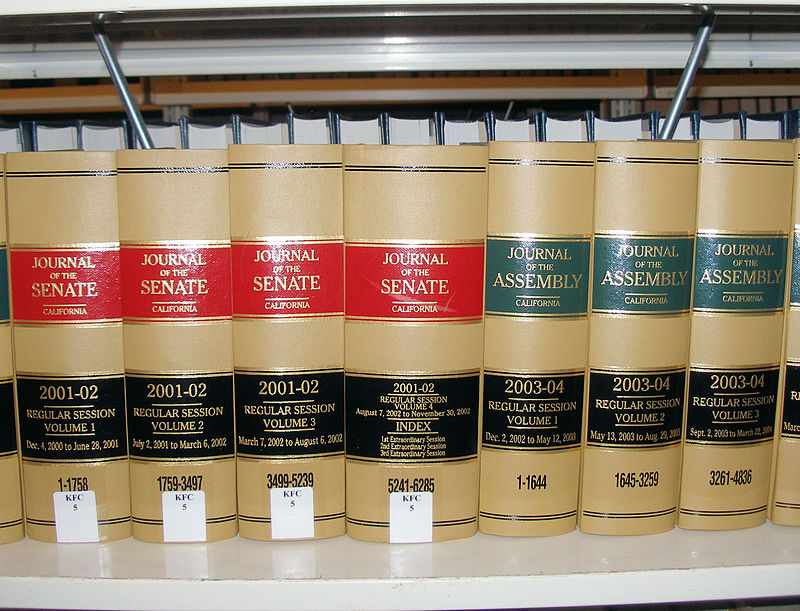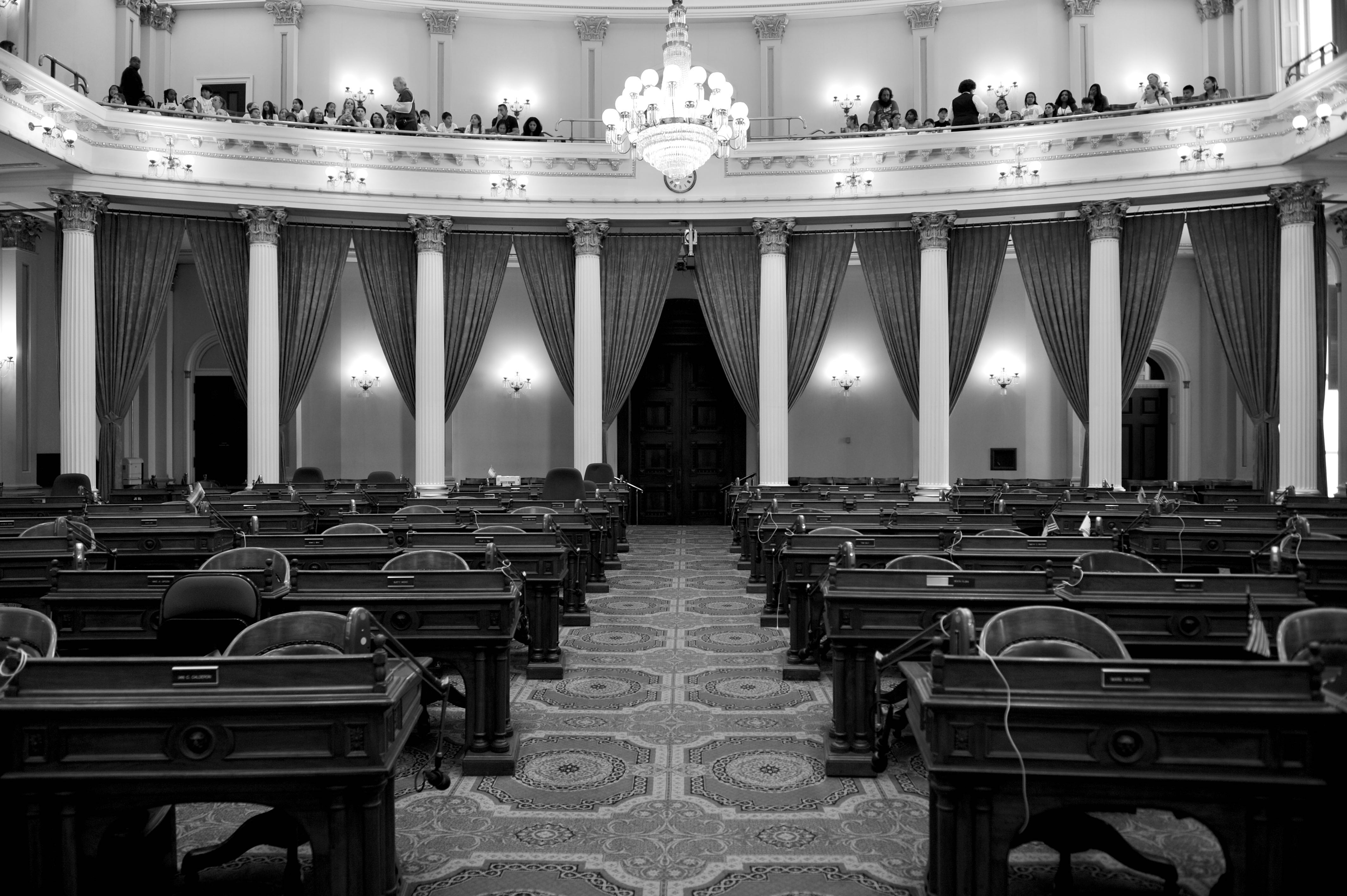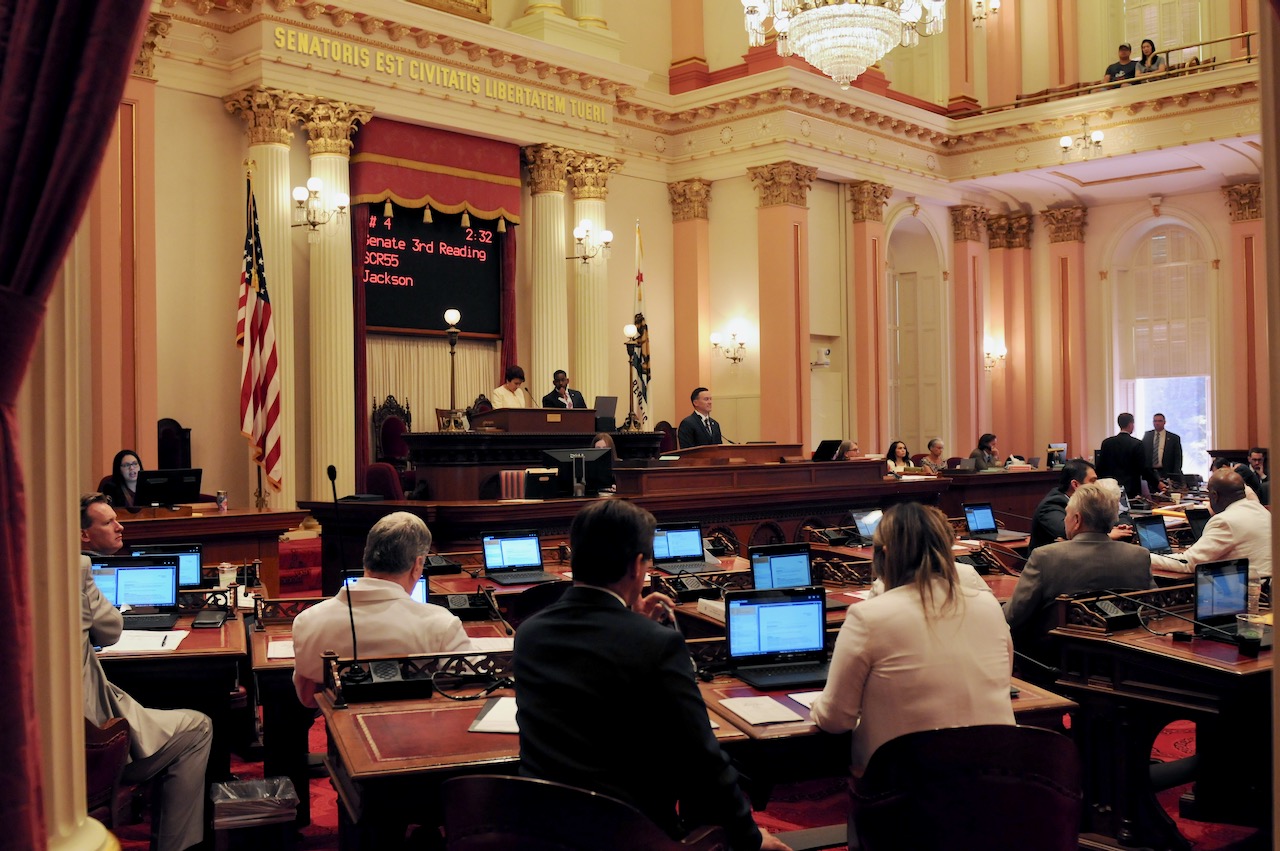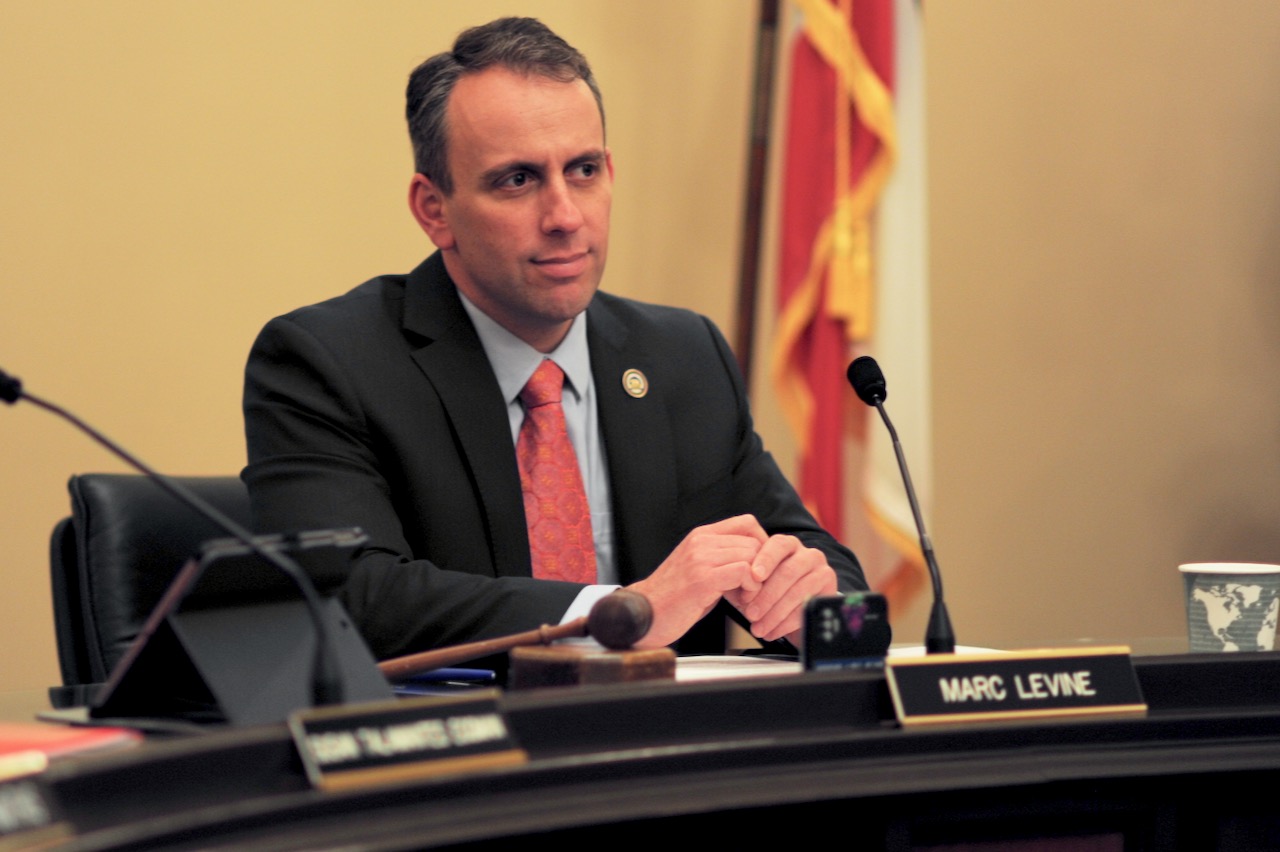
Journals of the California Legislature. (Photo: Wikipedia)
California Assembly Proposes Remote Attendance and Voting
Will ACA 25 Be on the November Ballot?
By Chris Micheli, May 25, 2020 3:17 pm
ACA 25 would allow the Legislature to restrict the public’s physical access to any legislative proceeding ‘if such access is not practical under the circumstances of the state of emergency or due to the manner in which the proceeding is conducted.’
Assembly Constitutional Amendment 25 by Assemblyman Kevin Mullin (D-South San Francisco), was introduced last week to provide for remote attendance and voting at legislative proceedings during declared states of emergency. ACA 25 would add Section 21.5 to Article IV, which deals with the legislative branch of state government, of the California Constitution. If passed by the Legislature, this measure would be placed on the November 3 statewide ballot for a vote of the electorate. A simple majority vote by the people is required for its adoption.
ACA 25 was introduced on May 21 and is jointly authored by four Assembly members, with an additional 19 Assembly Members as co-authors. 54 votes are needed for passage on the Assembly Floor, as well as 27 votes on the Senate Floor. Constitutional amendments proposed by the Legislature require a 2/3 majority vote for passage in each house, but they are not presented to the Governor for signature.
Some legislative observers believe that the California Constitution precludes remote voting, and probably remote legislative proceedings as well. That is because Article IV generally requires the Legislature to convene in regular session and establish a quorum for conducting official business, and that legislative proceedings be open and public.
In fact, as amended by Prop. 54 a few years ago, there is also a right of the public to attend and record these open legislative proceedings.
ACA 25, if adopted by the voters in November, would permit state legislators to remotely attend and vote in any official legislative proceedings, or even to vote by proxy if either the Assembly or the Senate adopts a rule to permit proxy voting. Remote attendance and voting could occur during the pendency of a state-declared or a federally-declared state of emergency.
This would be allowed, pursuant to proposed subdivision (a), when it is necessary “to conduct the business of the people and to maintain continuity of government.” This subdivision would allow the use of technology, without specification, for legislators to note be “physically present in the State Capitol,” and to attend and vote remotely or to vote by proxy. This may occur during the entire time (i.e., “the pendency”) of a declared state of emergency by either the President or the Governor.
Subdivision (c) of ACA 25 defines state of emergency to mean “the existence of conditions of disaster or of extreme peril to the safety of persons and property within the State, or parts thereof, including, but not limited to, such conditions as an attack or probable or imminent attack by an enemy of the United States, fire, flood, storm, insurrection, earthquake, volcanic eruption, or pandemic or other public health emergency.”
Subdivision (b) provides that a legislator’s “remote participation” is the same as if it had occurred while the legislator was physically present in the State Capitol. While subdivision (b)(3) requires remote participation to be included in the audiovisual recordings required pursuant to Section 7 of Article IV (which was adopted by the voters in Prop. 54), subdivision (b)(4) of ACA 25 allows either house of the Legislature by a 2/3 vote to waive all the audiovisual requirements that would otherwise be in effect. This is allowed if the Legislature determines that “compliance is not practicable under the circumstances of the state of emergency,” without any further guidance being provided regarding how such a determination would be made.
Under current law, Article IV, Section 7 of the California Constitution requires the Legislature to “cause audiovisual recordings to be made of all proceedings….in their entirety” and “shall make such recordings public through the Internet within 24 hours after the proceedings have been recessed or adjourned for the day, and shall maintain an archive of said recordings….” This provision could be waived by the Legislature is its sole discretion.
In addition, ACA 25 would allow the Legislature to restrict the public’s physical access to any legislative proceeding “if such access is not practical under the circumstances of the state of emergency or due to the manner in which the proceeding is conducted.” This, too, is left without specific parameters, other than a statement that “restrictions shall be no greater than necessary to ensure the health and safety of Members, legislative employees, and members of the public.”
Subdivision (b)(4)(B) would provide this ability to deny physical access to the State Capitol and specifies that it is “notwithstanding paragraph (1) of subdivision (c) of Section 7.” This provision of the existing state constitution was also amended by the state’s voters in Prop. 54, which states that “the proceedings of each house and the committees thereof shall be open and public. The right to attend open and public proceedings includes the right of any person to record by audio or video means any and all parts of the proceedings….”
As a result, this provision of ACA 25 would allow the Legislature to override the two provisions adopted by voters in Prop. 54. ACA 25 does provide that “an aggrieved party” would have a right to challenge this restriction in a civil action and seek injunctive relief. However, the courts so far in the current pandemic have not overruled the Governor’s use of executive orders, so it is unclear whether a member of the public would be successful under this provision.
Subdivision (d) of ACA 25 requires the Legislature to “choose technology to effectuate this section that furthers the goals of security, the integrity and efficiency of the legislative process, and accessibility for Members [legislators] who participate in proceedings remotely and members of the public who seek to view proceedings conducted by remote participation.”
Finally, if passed by the statewide electorate, subdivision (e) of ACA 25 would provide that, if 20% or more of the Members of the Assembly or Senate cannot attend a legislative proceeding during a state of emergency due to death, disability, etc., a quorum to conduct official legislative business may be established by a majority of those legislators who are actually able to attend the proceeding. Moreover, in such cases, the Legislature could adopt by a statute a means for temporarily filling vacancies in the Legislature. This is provided pursuant to subdivision (f) of ACA 25.
The ability of legislators to attend proceedings and vote remotely would end when the state of emergency is terminated. The provisions of ACA 25 would be implemented by resolution adopted by either house of the legislature, or by both houses using a concurrent resolution. In either case, such resolutions would require a 2/3 majority vote of both houses for adoption pursuant to subdivision (h)(1). These rules, if adopted, would also have to specify how remote attendance and voting would occur, as well as provide procedures for authenticating a legislator’s remote attendance and voting.
According to the respective calendars published in the Assembly and Senate Daily Files, June 25 is the last day for a legislative measure to qualify for the November 3 General Election ballot pursuant to Elections Code Section 9040. As such, ACA 25 would need to be adopted by a 2/3 majority vote of both the Assembly and Senate within the next four weeks. Political observers believe the measure will be brought up as part of the state budget accord that will need to be passed by the June 15 constitutional deadline.
ACA 25 was Introduced by Assembly Members Mullin, Ting, Cooley, and Waldron
(Principal coauthors: Assembly Members Bonta, Chiu, Gipson, and Low)
(Coauthors: Assembly Members Aguiar-Curry, Berman, Bloom, Cunningham, Daly, Eggman, Kalra, Levine, Nazarian, Quirk, Quirk-Silva, Reyes, Luz Rivas, Blanca Rubio, Smith, and Wicks)
- What Information Has to Be on the LegInfo Website? - April 19, 2024
- New Assembly Bill Would Ban NDAs in Legislative Negotiations - April 19, 2024
- Frequently Asked Questions about California Bills Having Certain Provisions - April 19, 2024





One thought on “California Assembly Proposes Remote Attendance and Voting”